Program in brief
This program allows students to acquire the professional knowledge, analytical and communication skills needed to handle effectively a variety of maritime issues.
- Program Director: Associate Professor Yusuke Takagi
- Degree Offered: Master of Policy Studies
- Language of Instruction: English
- Time Schedule:
- Program duration…1 year
- Enrollment…October
- Graduation…September
- Financial Support
- If you belong to any maritime safety and security related organization in eligible countries, you can apply for financial support from JICA (Japan International Cooperation Agency). As for eligible countries, please check with JICA office.
- How to Apply
- Apply for the financial support by JICA (as a participant of JICA Knowledge Co-Creation Program):
Please apply through your respective maritime safety and security related organization. For more details, please contact to:
JICA office: Click here (JICA offices in Asia)
JICA Chugoku Center: (mail to) cicttp@jica.go.jp
- Externally funded or self-financed international applicants:
MSP brochure Click here
Online Application Click here
The Maritime Safety and Security Policy Program (MSP) is a collaborative program designed and administered jointly by GRIPS and the Japan Coast Guard (JCG). This program makes it possible for students to benefit from the resources of both institutions in the fields of public policy, security studies, maritime safety, and maritime security. The students will have the opportunity to acquire professional knowledge, analytical skills, and communication skills relevant to their work while becoming members of a network of future coast guard leaders in the world.
Students in this program will study in Tokyo at GRIPS during the first half of the academic year and in Kure, Hiroshima at the Japan Coast Guard Academy (JCGA)–the JCG’s most important educational institution–during the second half.
Study at GRIPS
After enrolling in the program, students will take required and elective courses at GRIPS from October through March. The required courses are International Relations, International Security Studies, International Law, International Relations in East Asia, and International Law of the Sea. The elective courses will enable students to deepen their knowledge in the fields of their interest. The elective subjects include courses in politics, economics, national security, and policy making.Study at the JCGA
From April through July, the students will take courses and participate in practical training and educational programs at the JCGA. The required courses are Policy for Search and Rescue, Salvage and Maritime Disaster Prevention, and Maritime Police Policy. The students can further enhance their ability to effectively execute their duties as coast guard leaders in Asia through the study of a wide range of elective subjects. The JCGA’s elective courses are designed to develop students’ knowledge of science, technology, and criminal investigation, all of which are vital elements of effective policy formulation.The students will attend lectures focusing on past maritime incidents and possible future scenarios, offered by leading experts and JCG officers. Through lectures and discussions, they will enhance their understanding of the roles played by maritime law enforcement agencies and learn to identify best practices.
Research Paper
During the course of one year, each students is required to write a research paper on issues relevant to the study of maritime safety and security. In order to do so, the student will work together with two academic advisors—one each from GRIPS and the JCGA—to complete the paper before graduation.Target Group
Junior coast guard officers from Japan and overseas who have more than 3 years work experience and also who are under 46 years of age as of October 1, 2022.
Eligibility
- Eligible countries to apply for the financial support by JICA:
Please inquire to JICA office: Click here (JICA offices in Asia)
or JICA Chugoku Center: (mail to) cicttp@jica.go.jp
- Externally funded or self-financed international applicants:
Nationals of countries with which Japan has diplomatic relations: Click here
Maritime Safety and Security Policy Program Curriculum 2024/2025
(as of October 2024)
CATEGORY COURSE NAME INSTRUCTOR I
REQUIRED COURSES
Independent Study Various International Relations in East Asia Takagi International Relations Iwama International Security Studies Michishita Maritime Police Policy Okuzono International Law Shimoyama, Iwatani International Law of the Sea Furuya Policy for Search & Rescue, Salvage and Maritime Disaster Prevention Yamaji Case Study on Maritime Safety and Security Policy I Furuya Case Study on Maritime Safety and Security PolicyⅡ Furuya II
RECOMMENDED COURSES
Essential Microeconomics Kurosawa Essential Macroeconomics Yokoyama Economic Development of Southeast Asia Kudo Government and Market Hatanaka Development Economics Kijima East Asian Economies Kudo The Making of Modern Japan Pressello Government and Politics in Japan Masuyama International Political Economy Chey Comparative Politics Takenaka State and Politics in Southeast Asia Lim Non-Traditional Security Cross Analysis of Great Power Politics Iwama, et al. Comparative Political Economy Kanchoochat International Development Policy Ohno The World and the SDGs Kudo Introduction to Quantitative Methods Morohosi Introduction to Oceanography Horiuchi Marine Environment and Pollution Kawamura International Comparative Criminal Law Shintani Contemporary Japanese Maritime Gray Zone Securiy Policy Furuya Safety Management Systems I Noma Safety Management Systems Ⅱ Yamada Ship Maneuverability and Practical Operation TBA Fundamentals of Advanced Energy Engineering Kanki Information Management System I Yamanaka Information Management System Ⅱ Isozaki III
ELECTIVE COURSES
Selected Topics in Policy Studies I -IV Courses not listed in this table X
OTHERS
Describing Tables and Figures TBA Thesis Writing for MSP O'neill Qualitative Writing TBA Introduction to Academic Research Petchko Introduction to Academic Writing Petchko Other courses offered by the Center for Professional Communication Career Destinations
Graduates of MSP Program are expected to take core positions in their coast guard agencies. While executing their duties, they also have an opportunity to disseminate the knowledge they have gained from GRIPS and the JCGA to their agencies and beyond. In addition, graduates are in a unique position to play a central role in their organizations’ international negotiations by drawing on the human networks cultivated in the program.
MSP Alumni and Currrent students list
AY2015
1st batch
Ahmad Fathoni DGST (Directorat General of Sea Transportation)

Ahmad Kamil bin Abdul Halim MMEA (Malaysia Maritime Enforcement Agency)

Budhi Asti BAKAMLA (Indonesia Coast Guard)

Bui The Duong VCG (Vietnam Coast Guard)

Do Van Minh VCG (Vietnam Coast Guard)
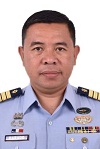
Glen Barsanas Daraug PCG (Philippine Coast Guard)
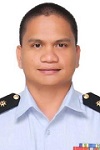
Jay Tristan Tarriela PCG (Philippine Coast Guard)

Mohamad Shukri bin Khotob MMEA (Malaysia Maritime Enforcement Agency)
.jpg)
小野寺 寛晃 / Hiroaki Onodera 海上保安庁 / Japan Coast Guard
.jpg)
米沢 夏希 / Natsuki Yonezawa 外務省 / MOFA (Ministry of Forein Affairs)
.jpg)
.jpg)
AY2016
2nd batch
Chandra Kresna Riyanto National Search and Rescue Agency Republic of Indonesia
(BASARNAS)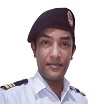
Hizam bin Zulkifli Malaysian Maritime Enforcement Agency/
Malaysian Coast Guard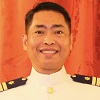
Jaybom Japay Calica Philippine Coast Guard

Lejanie Tampoc Dy Philippine Coast Guard
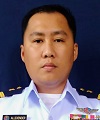
Radzil Allexender bin Raphael Malaysian Maritime Enforcement Agency
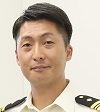
半沢 優 / Yu Hanzawa 海上保安庁 / Japan Coast Guard
1.jpg)
1.jpg)
AY2017
3rd batch
Abd Hafis bin Hussin Malaysia Maritime Enforcement Agency (MMEA)

Adzizul Bin Latip Abu Bakar Maritime Base (Middle Rock)

Tony Rajinda Daniel Sri Lanka Coast Guard (SLCG)

Eleizer Gonzales Ibarrientos Philippine Coast Guard (PCG)

Mohd Noor Haidzir bin Mohd Fauzi Marine Department Malaysia

梶屋 優一 / Yuichi Kajiya 海上保安庁 / Japan Coast Guard

野原 昌子 / Masako Nohara 海上保安庁 / Japan Coast Guard
1.jpg)
1.jpg)
AY2018
4th batch
Buddhika Ajith Godakanda Sri Lanka Coast Guard (SLCG)
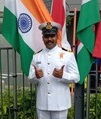
Dhanapandian Manoharan Indian Coast Guard

Hernandez Rodel Bocalan Philippine Coast Guard

Mahantha Mulla Gamage Uditha Roshan Gamage Sri Lanka Coast Guard (SLCG)

Mohd Nizam Bin Mohd Yasin Malaysian Maritime Enforcement Agency (MMEA)

Muhamad Izuar Bin Zainudin Malaysian Maritime Enforcement Agency (MMEA)

Tran Nam Phuong Vietnam Coast Guard

奥村 太 / Futoshi Okumura 海上保安庁 / Japan Coast Guard

赤木 貴法 / Takanori Akagi 海上保安庁 / Japan Coast Guard
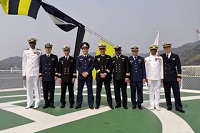
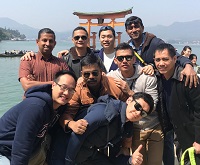
AY2019
5th batch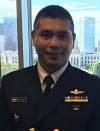
Panupong Jamruenvong Thai Maritime Enforcement Command Center Jamruenvong
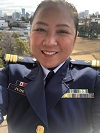
Jude Greanata Dollesin Philippine Coast Guard

Mohd Nashrul Bin Nashahar Malaysian Maritime Enforcement Agency
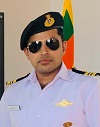
Niranjan Pratap Singh Indian Coast Guard
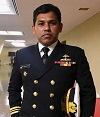
Senevirathna Asanka Prathap Sri Lanka Coast Guard
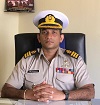
Mudiyanselage Wijitha Mahanama Sri Lanka Coast Guard

佐々木 慧 / Kei Sasaki 海上保安庁 / Japan Coast Guard
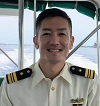
坂上 悠 / Yu Sakaue 海上保安庁 / Japan Coast Guard
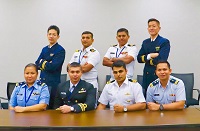
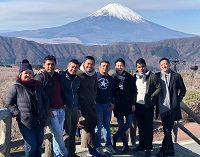
AY2020
6th batch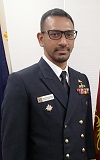
Rangana Athukorala Sri Lanka Coast Guard
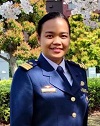
Noemie Guirao-Cayabyab Philippine Coast Guard
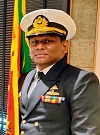
Kalukapuge Chinthaka Kumara Kalukapuge Sri Lanka Coast Guard

Perez Jeremiah Marquez Maritime Industry Authority
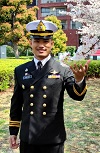
Poolperm, LT. Worawit The Royal Thai Naval Special Warfare Command / Thai Maritime Enforcement Command Center
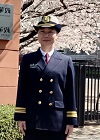
安藤 美緒 / Mio Ando 海上保安庁 / Japan Coast Guard
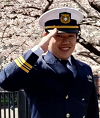
髙城 陽平 / Yohei Taki 海上保安庁 / Japan Coast Guard
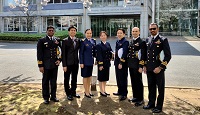
②.jpg)





